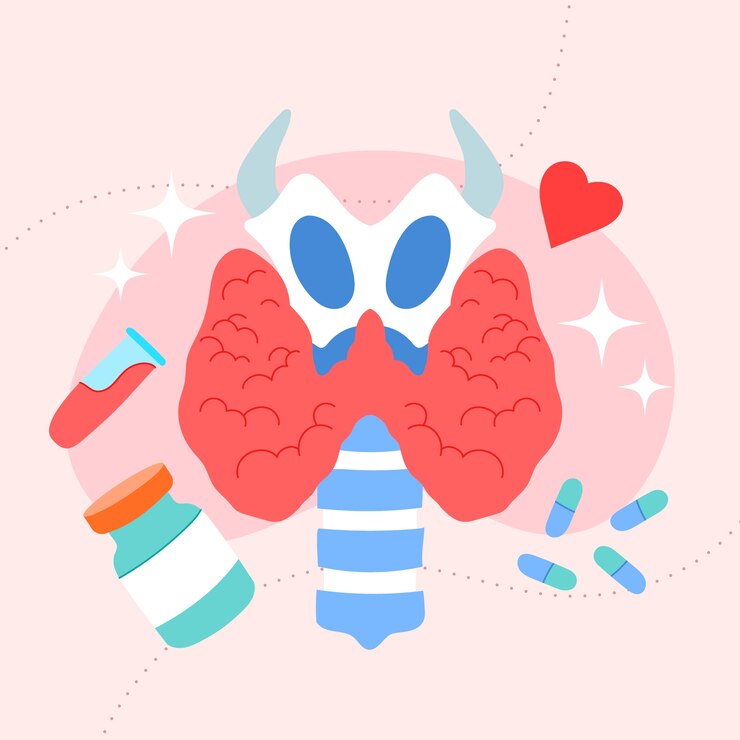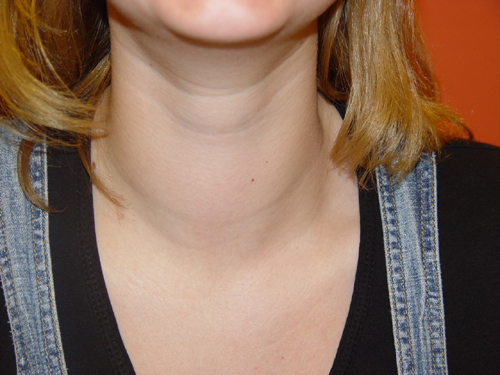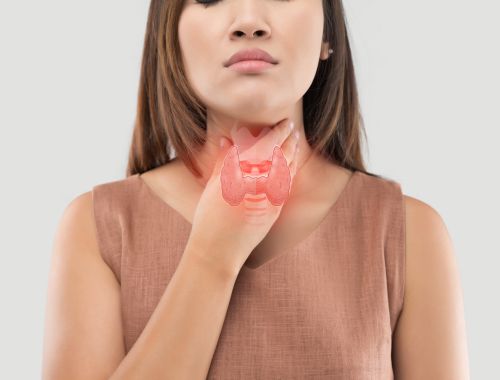Understanding Simple Goitre: An Overview
Simple goitre, also known as non-toxic goitre or colloid goitre, is a common thyroid disorder characterized by the enlargement of the thyroid gland. While typically benign and asymptomatic, simple goitre can cause cosmetic concerns and, in some cases, lead to complications if left untreated. In this article, we provide an overview of simple goitre, including its causes, symptoms, diagnosis, and management.
Anatomy and Function of the Thyroid Gland
The thyroid gland, situated in the front of the neck below the Adam’s apple, plays a crucial role in regulating metabolism, growth, and development. It produces thyroid hormones, namely thyroxine (T4) and triiodothyronine (T3), which influence various physiological processes, including heart rate, body temperature, and energy metabolism. The thyroid gland is under the control of the pituitary gland, which secretes thyroid-stimulating hormone (TSH) to regulate thyroid hormone production.
Causes and Risk Factors Associated with Simple Goitre
Simple goitre can develop due to various factors, including iodine deficiency, autoimmune thyroiditis, genetic predisposition, hormonal imbalances, and certain medications. Iodine deficiency is one of the leading causes of simple goitre worldwide, as iodine is an essential nutrient required for the synthesis of thyroid hormones. Autoimmune thyroiditis, such as Hashimoto’s thyroiditis, can also contribute to goitre formation by causing inflammation and damage to the thyroid gland. Other risk factors for simple goitre include age, gender (more common in females), family history, and exposure to environmental toxins.
Symptoms and Clinical Presentation of Simple Goitre
In many cases, simple goitre may not cause any symptoms, especially in the early stages when the enlargement is mild. However, as the goitre grows larger, individuals may experience symptoms such as visible swelling or enlargement of the neck, difficulty swallowing or breathing, hoarseness, and a sensation of pressure or fullness in the neck. Some patients may also complain of a feeling of discomfort or tightness in the throat.
Diagnostic Evaluation and Imaging Modalities for Simple Goitre
The diagnosis of simple goitre typically involves a thorough medical history, physical examination, and various imaging studies. A healthcare provider may palpate the neck to assess the size and consistency of the thyroid gland and inquire about any associated symptoms. Imaging modalities such as ultrasound, computed tomography (CT), or magnetic resonance imaging (MRI) may be used to visualize the thyroid gland and evaluate the extent of enlargement. Blood tests, including thyroid function tests and thyroid antibody assays, may also be performed to assess thyroid hormone levels and detect underlying autoimmune thyroid disorders.
Classification and Grading of Simple Goitre
Simple goitre can be classified based on its size, morphology, and underlying aetiology. Classification systems such as the World Health Organization (WHO) grading system classify goitres into different categories based on the degree of enlargement and palpability. Grade 0 represents a normal-sized thyroid gland, while higher grades indicate increasing levels of enlargement. Other classification systems may categorize goitres based on their echogenicity, vascularity, and presence of nodules or cysts.
Management Strategies for Simple Goitre: Medical and Surgical Approaches
The management of a simple goitre depends on various factors, including the size of the goitre, the presence of symptoms, underlying aetiology, and patient preferences. In cases of small, asymptomatic goitres, a watchful waiting approach may be adopted, with regular monitoring of thyroid function and imaging studies. Dietary supplementation with iodine may be recommended for individuals with iodine deficiency-related goitre. Thyroid hormone replacement therapy may be prescribed for patients with underlying thyroid hormone imbalances or autoimmune thyroiditis. Surgical intervention, such as thyroidectomy or partial thyroidectomy, may be considered for large, symptomatic goitres, or in cases where malignancy or compression of surrounding structures is suspected.
Thyroid Hormone Replacement Therapy in Simple Goitre
Thyroid hormone replacement therapy is often used in the management of simple goitre, particularly in cases of hypothyroidism or autoimmune thyroiditis. Levothyroxine, a synthetic form of T4 hormone, is the most commonly prescribed thyroid hormone replacement medication. By restoring thyroid hormone levels to normal, levothyroxine therapy can help suppress thyroid-stimulating hormone (TSH) secretion from the pituitary gland, thereby reducing the size of the goitre and alleviating symptoms. Thyroid hormone replacement therapy may be initiated gradually, with regular monitoring of thyroid function tests to ensure optimal hormone levels.
Dietary and Lifestyle Modifications for Simple Goitre Management
In addition to medical and surgical interventions, dietary and lifestyle modifications can play a role in the management of simple goitre. Adequate dietary intake of iodine-rich foods, such as seafood, dairy products, and iodized salt, is essential for preventing iodine deficiency-related goitre. However, excessive iodine intake should be avoided, as it can exacerbate thyroid dysfunction in susceptible individuals. Smoking cessation is recommended, as smoking has been associated with an increased risk of autoimmune thyroid disorders and goitre formation. Regular physical activity and maintaining a healthy weight can also support thyroid health and overall well-being.
Complications and Long-Term Prognosis of Simple Goitre
Simple goitre is generally considered benign and non-life-threatening, but it can lead to complications if left untreated. Large goitres may compress adjacent structures in the neck, such as the trachea or oesophagus, causing symptoms such as difficulty breathing or swallowing. In rare cases, simple goitre may be associated with thyroid nodules or thyroid cancer, necessitating further evaluation and management. With appropriate treatment and monitoring, the long-term prognosis for simple goitre is generally favourable, with most patients experiencing symptom relief and normalization of thyroid function.
Emerging Research and Advances in the Treatment of Simple Goitre
Ongoing research efforts are focused on identifying novel treatment strategies and therapeutic targets for simple goitre. Clinical trials are investigating the use of targeted molecular therapies, immunomodulatory agents, and novel drug delivery systems for the management of autoimmune thyroid disorders and goitre-related complications. Advances in imaging technology, such as molecular imaging and contrast-enhanced ultrasound, hold promise for improving the early detection and characterization of thyroid nodules and guiding personalized treatment decisions. Additionally, efforts are underway to develop minimally invasive techniques and alternative approaches to thyroid surgery, such as radiofrequency ablation and ethanol injection therapy, as alternatives to traditional thyroidectomy.
Patient Education and Support for Individuals with Simple Goitre
Patient education and support are essential components of the management of simple goitre, helping individuals make informed decisions about their treatment options and self-care practices. Healthcare providers should provide comprehensive information about the nature of the condition, potential causes and risk factors, available treatment modalities, and expected outcomes. Support groups and online communities can offer valuable peer support, practical tips, and resources for coping with the physical and emotional challenges of living with goitre. Encouraging open communication and collaboration between patients, caregivers, and healthcare providers can foster a sense of empowerment and improve patient satisfaction and adherence to treatment.
Multidisciplinary Approach to Simple Goitre Care: Role of Endocrinologists, Surgeons, and Allied Health Professionals
The management of simple goitre often requires a multidisciplinary approach, involving collaboration between endocrinologists, surgeons, radiologists, pathologists, and other allied health professionals. Endocrinologists play a key role in diagnosing and managing underlying thyroid disorders, prescribing appropriate medications, and monitoring thyroid function and hormone levels. Surgeons may be involved in the evaluation and surgical treatment of large or symptomatic goitres, performing thyroidectomy or other surgical procedures as indicated. Radiologists and pathologists contribute to the diagnosis and characterization of thyroid nodules and thyroid cancer, providing valuable information for treatment planning and prognostication. Allied health professionals, such as nurses, dietitians, and psychologists, offer supportive care and education to patients and their families, addressing the physical, emotional, and nutritional aspects of living with goitre.
Prevention Strategies and Public Health Initiatives for Simple Goitre
Preventing simple goitre involves addressing underlying causes such as iodine deficiency and promoting public health initiatives to improve iodine nutrition and awareness. Salt iodization programs, implemented by governments and international organizations, have been successful in reducing the prevalence of iodine deficiency disorders, including simple goitre, in many countries. Public education campaigns, school-based iodine supplementation programs, and community outreach efforts can raise awareness about the importance of iodine-rich diets and the prevention of goitre-related complications. Healthcare providers can play a role in screening high-risk populations for iodine deficiency and providing appropriate dietary counselling and supplementation as needed.
Conclusion
Simple goitre is a common thyroid disorder characterized by the enlargement of the thyroid gland, often resulting from iodine deficiency, autoimmune thyroiditis, or other underlying factors. While typically benign and asymptomatic, simple goitre can cause cosmetic concerns and, in some cases, lead to complications such as difficulty breathing or swallowing. The management of simple goitre involves a multidisciplinary approach, including medical, surgical, and lifestyle interventions tailored to individual patient needs. Ongoing research efforts are focused on identifying novel treatment strategies and advancing our understanding of the underlying mechanisms of goitre formation. By promoting public health initiatives, raising awareness, and providing comprehensive care and support to individuals with goitre, we can improve outcomes and enhance the quality of life for affected individuals.







